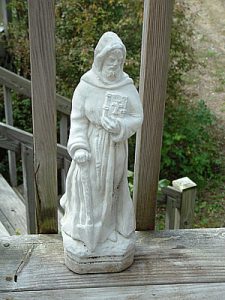Menu

St. Adelard of Corbie, patron saint of typhus sufferers.
Adelard (752-827) was the grandson of Charles Martel, nephew of King Pepin and first cousin to Charlemagne. He became a monk, at the age of 20, at Corbie in Picardy in 773. Eventually he was chosen abbot, and became Charlemagne's counselor. He was forced by the king to quit the monastery and work for him as chief minister for his son Pepin. He was accused of supporting a rival power (Bernard) against Emperor Louis the Debonair and was banished to a monastery on the island of Heri. Five years later he was recalled to the king's court (821). He later retired to the Abbey at Corbie and died January 2 after an illness. Miracles were reported after his death. When Adelard first became monk at Corby in Picardy (in 773), his first assignment was gardener of the monastery. He did his job humbly and piously, praying throughout the day. His great virtues eventually helped him become Abbot. [1]
Saint Adelard was canonized by Pope John XIX in 1026.
With the above description in mind, it will not be much of a surprise that Adelard became the patron saint of gardeners. In addition, he became known as the patron of sufferers of fevers and typhus. [2]
In this case it will be important to know that for a long time, the diagnose 'typhus' was used for all types of severe febrile illness. The Greek term [typhos] (smoke, mist, fog) was employed by Hippocrates to define a confused state of the intellect, with a tendency to stupor (stupor attonitus); and in this sense it is aptly applied to typhus fever with its slow cerebration and drowsy stupor. Boissier de Sauvages first (in 1760) called this fever "typhus," and the name was adopted by Cullen of Edinburgh in 1769. Previous to the time of de Sauvages typhus was known as "Pestilential" or "Putrid Fever," or by some name suggested by the eruption, or expressive of the locality in which it appeared, as "Camp," "Jail," "Hospital," or "Ship Fever". [3]
In modern medicine, typhus refers to a group of infectious diseases that are caused by rickettsial organisms and that result in an acute febrile illness. Arthropod vectors transmit the etiologic agents to humans. The principle diseases of this group are epidemic or louse-borne typhus (Typhus exanthematicus, classic typhus fever; caused by Rickettsia prowazekii) and its recrudescent form known as Brill-Zinsser disease, murine typhus (flea-borne typhus fever, Shop typhus; caused by Rickettsia typhi -Rickettsia mooseri-; R. felis), and scrub typhus (mite-borne typhus fever, Tsutsugamushi disease; caused by Orientia tsutsugamushi). [4]